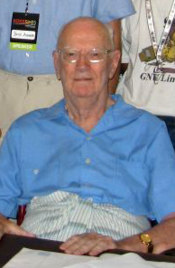 It's tempting to say goodbye to Arthur C Clarke, but given the volume of work he has produced, he'll be around for a long time yet.
It's tempting to say goodbye to Arthur C Clarke, but given the volume of work he has produced, he'll be around for a long time yet.I grew up reading science fiction and works by writers like Isaac Asimov, Frank Herbert and Arthur C Clarke featured heavily, and I remember in my youth buying secondhand yellow-paged paperbacks from jumble sales and second hand bookshops. I still have many of them today and have now in my collection two Arthur C Clarke first editions.
He wrote smart, inventive and sometimes darkly funny short stories, as well as huge epic novels. They were always human, not focussing too much on fantastic technology - the story and characters coming first. Clarke's HAL, the artificial intelligence super computer in 2001: A Space Odyssey driven to psychosis by clumsy programming, is probably the most famous of those characters and despite 'his' homicidal tendencies, the most sympathetic. The 1968 movie, directed by Stanley Kubrick and written in a parallel collaboration with Clarke, is still considered by many to be the best sci-fi movie ever.
In a science fiction field now much dominated by dark dystopian futures, like Asimov, Clarke's view of the future was filled with a bright optimism typical of many sci fi writers of the post war period.
Despite his interest in science, he also poked around in the occult and supernatural, UFOs and other strange phenomena. However, he also maintained a healthy scepticism about religion, combined with a comic wit.
"I would defend the liberty of consenting adult creationists to practice whatever intellectual perversions they like in the privacy of their own homes; but it is also necessary to protect the young and innocent."Arthur C Clarke - a writer of monolithic proportions.
Arthur C. Clarke, 1984.


1 comment:
Please dont forget Ray Bradbury in the list
Post a Comment